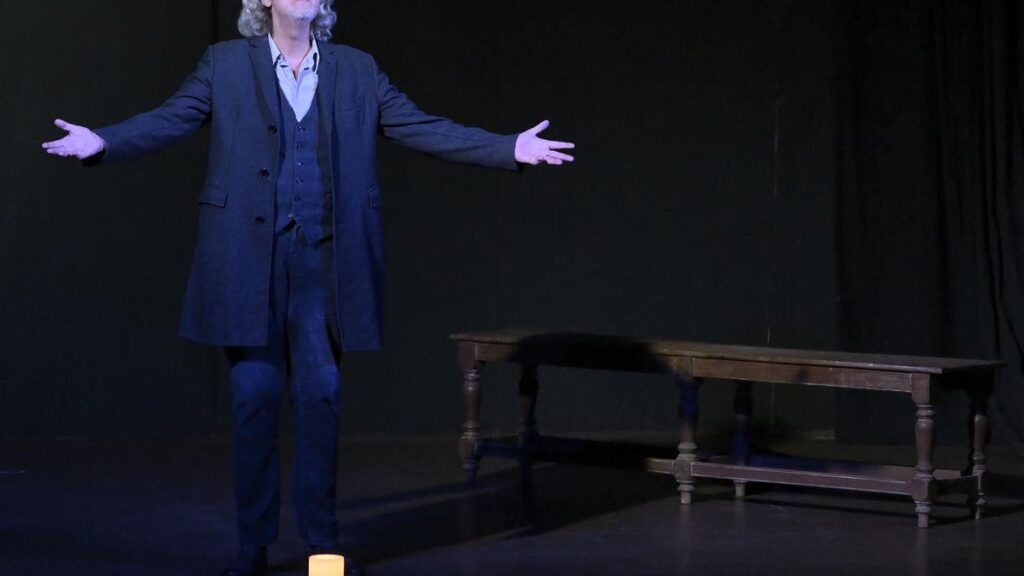
French stage artiste Jean-Paul Sermadiras performed a theatrical solo based on Fyodor Dostoevsky’s story, “The Dream of a Ridiculous Man”, at the Alliance Francaise recently.
| Photo Credit: S.S. Kumar
If trying to transmit to stage the rush of existentialist thoughts ambushing the mind of a character created by one of the great novelists of the 19th century is not a challenge in itself, to do so with minimalist theatre, can be a next to impossible prospect.
Yet, French stage artiste Jean-Paul Sermadiras seemed to pull it off with a practised efficiency, as he presented a theatrical solo based on Russian writer Fyodor Dostoevsky’s story, “The Dream of a Ridiculous Man” at the Alliance Francaise.
The actor portrayed the protagonist of Dostoyevsky’s short story of 1877, using the bare minimum of props — a long bench and a candle lantern — and sparse, but mood-synced pieces of background score. The presentation in French has English subtitles projected on a background screen.
And, through the hour-long show, it felt like the performer had gripped those in the audience by their hand and led them to travel with the thoughts of the story’s protagonist who has just resolved to kill himself in a fit of nihilist angst.
Things only get progressively bleak thereon before we are allowed to breathe in hope and optimism.
The “ridiculous man” struggles to figure out the purpose of that chance meeting with a girl he had met on the street, whose cry for help he had ignored and hurried home that night.
As the protagonist slips into a vivid dream, where he has already killed himself, he is pulled out from inside the grave by a creature and flown across space and time, and discovers a paradise lit up by happy and innocent people, “their knowledge deeper and loftier than science”.
He dreams of how he is the personification of human greed that poisons the pristine place and plagues it with sin, lies, slavery and war. The first drop of blood is shed, factions arise and conflicts erupt.
Snapping out the dream is more than returning to a wakeful state, it is a moment of epiphany. Of how the transformative encounter with the unknown girl changed his destiny, of averting pulling the trigger and getting a second chance to re-evaluate and rediscover the beauty of existence.
The play alternates between dream and reality, the factual and the fantastical, the external illusion and the inner journey — a questioning or confrontation between dream and reality that is Ythier’s main working axis for the play.
The storytelling structure makes one wonder if they are indeed precursors of techniques such as stream-of-consciousness, even trace elements of magical realism, that would get popularised in literature almost two centuries later.
Olivier Ythier was stage director and Gilles David, of the Comédie Française theatre group, his associate for this co-production of Compagnie du Passage, La Fabrique du PasSage and Les Chercheurs de Lumière with the support of the General Council of Hauts de Seine, of Saint Cloud city and its Théâtre des 3 Pierrots
“Dostoevsky uses this narrative style of a dramatic monologue that gives the feeling that he is speaking his mind to the audience”, said Sermadiras, who had only a couple of weeks earlier, presented “Behind the Veil.. The Era of Mahsa” by Chahla Chafiq set against the backdrop of the Iranian Revolution of 1979, at the same venue.
“The Dream which goes to the roots of a human being is more challenging to adapt to stage than some of the author’s other works like The Idiot or The Brothers Karamazov”.
“Here, I try to live the experience of the text, portray the imagery of the dream as it were really about a place with people… only when the protagonist snaps out of his sleep does the audience return to the reality of the present”, Sermaridas said.
Generally audiences in the East, the Indian audiences more so, connect with the play perhaps due to their exposure to mysticism and spirituality, says Sermaridas, who has co-produced with Ythier, “Et pourtant, c’est la veille de l’aurore” (And Yet, It’s the Eve of Dawn), based on the writings of Sri Aurobindo, Satprem, Charles Baudelaire and Arthur Rimbaud.
Published – May 14, 2025 09:53 pm IST
Source:https://www.thehindu.com/news/cities/puducherry/a-dostoevsky-protagonist-transitions-from-text-to-theatre/article69575580.ece

